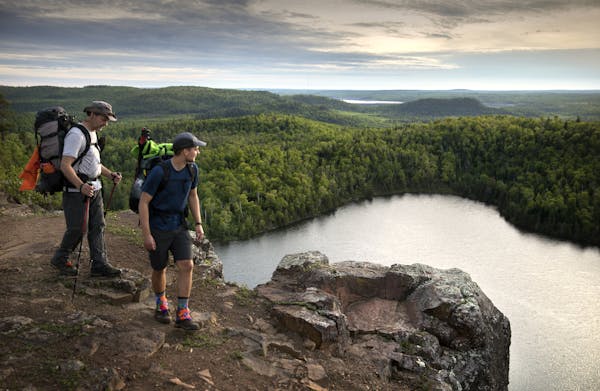Another Twins season is in motion, and so is that other season of keen interest for Minnesotans: camping.
Vigilant planners in the crowd with an affinity for state park campgrounds used their spring training to book sites well into this summer, owing to the system's much-scrutinized 120-day window for making reservations. (Campsites are currently booking for dates through the middle of August.)
The demand to get on the land is real, with signs of increased traffic. More than 11 million people visited the state's 75 parks and recreation areas in the last year, and nearly 1.9 million stayed over for at least a night at the ones that offer camping. So far this quarter, revenue is up nearly 2% over last year ($33.4 million), with daily permit sales up 42% and annual permits about 20%.
To accommodate such numbers, the massive system can be described as one of constant transformation, from unveiling new features for visitors to refining policies to dealing with a stockpile of maintenance and upgrade needs.
Change continues in the camping reservation system, too. The news might be met positively by some Minnesotans who have bristled at changes by parks managers in the Department of Natural Resources in recent years, and some on fire about other campers who have gamed the current system.
The state used to keep about one-third of the sites at the parks, first-come, first-served but went to an all-reservable system in 2016, aiming to improve access and draw more campers. That change peeved some people. Now, when people book 120 days in advance, a glitch in the online reservation system has unintentionally allowed some users to extend a reservation to 14 days. They aren't always canceling unwanted days.
The scenario at the most popular campgrounds (North Shore) and at premium times (weekends and holidays) has fueled more frustration despite the general availability — even on weekends — at parks elsewhere in Minnesota.
Still, managers in the DNR's Parks and Trails Division quietly added some new tools at the end of the 2023 camping season to help reservation-seekers and say significant improvements are planned for 2025, too.
Here are the takeaways from an interview with the DNR about the camping reservation system:
Next season: Changes to address overbooking
Rachel Hopper, a visitor services and outreach manager in the agency's Parks and Trails Division, said the DNR is taking a "methodical" approach to establishing new policies to put in place before reservations begin for the 2025 camping season.
"The overbooking issue does not affect the vast majority of reservation holders or the vast majority of campsites within our system," Hopper said, adding it amounts to about 1% of all reservations. "So, we are being very thoughtful in our approach to not negatively affect the majority of our visitors when trying to correct for the small number of people abusing system loopholes."
Despite the policy changes, Hopper said public demand for popular campsites, especially drive-in electric, at locations like the North Shore will continue to exceed availability.
New notifications are in place
Campers with reservations now receive three- and 15-day electronic notifications ahead of their stays, catching some who've forgotten about their commitment. Hopper said the DNR piloted the new feature at several parks last year. Positive feedback encouraged managers to implement the notifications for the entire system.
"There has been a reduction in empty sites both on the grid and reduction in reports of empty, or unused, campsites," she added.
Camper Annette Oullette of Duluth perhaps will be content to learn that. She and her husband, Gerry, have camped in the system for 41 years and said a main aggravation is arriving in a campground that appeared filled online to find empty sites as neighbors.
"I am not sure if these are no-shows or if people reserve sites for a weekend starting on Thursday just to secure a site even if they don't plan to arrive until Saturday," she said.
The DNR's perspective is that it's both.
The agency also is promoting its "Notify Me" tool for an alert when a campsite becomes available. Hopper said it was put in place a few years ago with precaution, knowing some users also might try to take advantage of it.
"We randomize release of sites and notifications to visitors to avoid potential gaming of the system," Hopper said. "Since [notification] is not immediate, the most popular sites are still hard to get even with the notification system. Some people also monitor the reservation system, watching for sites on their own, so those popular sites get snapped up quickly."
Modification limits pay dividends?
The DNR had discovered a practice called "date sliding," which was the root cause of the overbooking issue. This practice involved users reserving a block of dates that starts within the 120-day reservation window, but extends to dates outside the window, and then gradually modifying the reservation each day by paying an additional cost, until they were able to include premium periods. For example, Labor Day weekend.
To address this issue, the DNR revised the rules starting with the 2022 camping season. If anyone makes a reservation that includes dates beyond the 120-day window, they will have to wait for three weeks before they can make any modifications. Additionally, the new policy limits the number of modifications to two before the reservation needs to be canceled and a new booking made.
"People with the means had the most flexibility and access to the greatest number [of campsites]," Hopper said.
Cracking down on no-shows
"We are also consistently enforcing the no-show policy," Hopper said. A reservation is canceled with no refund given, and the campsite or lodging becomes available if the site isn't occupied by 11 a.m. the morning after the scheduled arrival date.
Hopper said in some cases, park staff are messaging reservation holders to double-check their status after a grace period.
"The policy changes we've implemented may be having the desired impact," Hopper said.
Said Oullette, the longtime camper: "I appreciate that they are always trying to tweak it and make it better. I don't want to complain, because I want people to enjoy the parks."

Wolves bounce back from second-quarter brawl to blow out Pistons 123-104
Twins swept by Cardinals to begin season as Bailey Ober stumbles in opener again

Souhan: Wolves, Edwards belatedly wake up following skirmish
Moore and Rinzel each make their NHL debut with the Blackhawks

